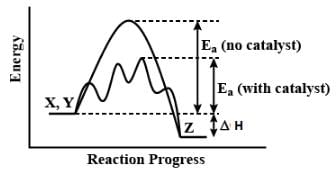Test: Catalysis (Old NCERT) - JEE MCQ
Test Description
10 Questions MCQ Test - Test: Catalysis (Old NCERT)
Test: Catalysis (Old NCERT) for JEE 2025 is part of JEE preparation. The Test: Catalysis (Old NCERT) questions and answers have been prepared
according to the JEE exam syllabus.The Test: Catalysis (Old NCERT) MCQs are made for JEE 2025 Exam.
Find important definitions, questions, notes, meanings, examples, exercises, MCQs and online tests for Test: Catalysis (Old NCERT) below.
Solutions of Test: Catalysis (Old NCERT) questions in English are available as part of our course for JEE & Test: Catalysis (Old NCERT) solutions in
Hindi for JEE course.
Download more important topics, notes, lectures and mock test series for JEE Exam by signing up for free. Attempt Test: Catalysis (Old NCERT) | 10 questions in 15 minutes | Mock test for JEE preparation | Free important questions MCQ to study for JEE Exam | Download free PDF with solutions
Detailed Solution for Test: Catalysis (Old NCERT) - Question 1
Test: Catalysis (Old NCERT) - Question 2
When body temperature is high, doctors advice consumption of light food. This is because
Detailed Solution for Test: Catalysis (Old NCERT) - Question 2
Test: Catalysis (Old NCERT) - Question 3
In heterogenous catalysis of a gaseous reactants over solid catalyst
Detailed Solution for Test: Catalysis (Old NCERT) - Question 3
Detailed Solution for Test: Catalysis (Old NCERT) - Question 4
Detailed Solution for Test: Catalysis (Old NCERT) - Question 5
Test: Catalysis (Old NCERT) - Question 6
Which of the following is the best example of shape selective catalysis?
Detailed Solution for Test: Catalysis (Old NCERT) - Question 6
Detailed Solution for Test: Catalysis (Old NCERT) - Question 7
Test: Catalysis (Old NCERT) - Question 8
Study the following reactions.

Which characteristic of catalyst is represented by them.?
Detailed Solution for Test: Catalysis (Old NCERT) - Question 8
Detailed Solution for Test: Catalysis (Old NCERT) - Question 9
Detailed Solution for Test: Catalysis (Old NCERT) - Question 10
Information about Test: Catalysis (Old NCERT) Page
In this test you can find the Exam questions for Test: Catalysis (Old NCERT) solved & explained in the simplest way possible.
Besides giving Questions and answers for Test: Catalysis (Old NCERT), EduRev gives you an ample number of Online tests for practice
Download as PDF




















